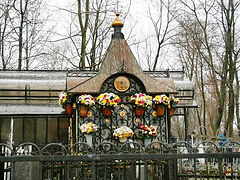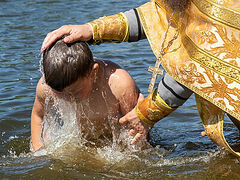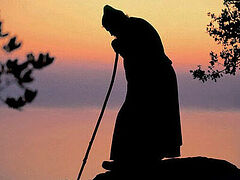How a Former Atheist was Baptized
They brought her in and seated her on a bench. Her roommates from the Neurosurgery Department left her in my care, went to pray and light candles and soon returned to the department. Her face was contorted, and saliva was running profusely through her twisted mouth.
“I want to get baptized,” she said.
“Good. But why did this desire appear? Due to fatigue from sickness?” I wondered.
“No.”
“Maybe the fear of surgery? It is natural for human beings to feel fear. You need not be ashamed of it,” I continued.
Then our conversation took such an unexpected turn that questions disappeared by themselves and the dialogue turned into a monologue.
“I persecuted Him for half my life. I mean God. Not only was I an atheist: I was also a lecturer on atheism. I denied everything and everyone. And that was my job, my convictions, and my faith in ‘scientific atheism’.”
She paused a little, wiped her mouth with a handkerchief, and went on:
“I taught ‘The Fundamentals of Scientific Atheism.’ I taught this course, lecturing at higher educational institutions and wherever I could. And then I was hit hard. My only daughter developed blood cancer. The tests could not lie—the doctors were sure of the diagnosis. My connections and attempts to change something were in vain. And, like a drowning person who clutches at a straw, I rushed to church. I fell in front of an icon of the Mother of God. I don’t remember what I screamed, how I implored Her for help and sobbed, but two days later the diagnosis was not confirmed. I came back to the church, approached the same icon and began to thank Her. I was honest with the Theotokos: I promised Her never to persecute Her Son again and renounce my views, but I was not yet ready to be baptized. I kept my promise, and now I await an operation due to my brain tumor. The doctors don’t promise anything good, and I finally want to be baptized with the full awareness of why and for what purpose, As well as why I have such a disease.”
I was listening without interrupting her or asking questions. They would have been unnecessary. A person who once imagined herself the master of nature and life was sitting in front of me. And now she was an infirm woman exhausted by brain cancer, who had crossed the threshold of a new awareness of who is who in this world. There is weak man and there is the Creator of the universe.
On the appointed day a priest came and baptized her in a wheelchair. The malady was destroying her not from day to day, but from hour to hour. I asked her to take Communion after the operation and return home. She promised to do that.
And that day I recalled my husband’s relative, a former “crime boss”, who would rob people in the post-war era, the poorest time for many in the USSR. In his old age he was paralyzed on the right side—the very hand that he had sinned with. He was baptized before his death (his other relatives prevented him from taking Communion).
Days went on as usual. And I kept thinking of Galina—that was her name. And at last, freed from endless chores, I went up to the floor where the Neurosurgery Department was located. As it turned out, by that time she had been not only operated on, but also gone home. Her roommates recognized me and were surprised.
“We were startled. In the ward she could not say a single word without acute pain, which contorted her face with convulsions, spattering her neck and chest all over with saliva, but with you she talked so much that we were dumbfounded by her confession. Apparently, the very atmosphere of the chapel was beginning to help her.”
I kept silent. After my many years of life in the Church, nothing surprised me. But I caught myself thinking, “Lord, give her time for repentance.”
For me that day was a greater revelation than just a miraculous healing. I was a witness of God's boundless love, forgiveness and amazing long-suffering towards us, unfortunate “rulers” of nature.
Annushka, or the first confession
At first Annushka1resisted... And she couldn’t think about the chapel at that moment. The diagnosis sounded too terrible—a brain tumor. And the doctors were pondering whether or not they should take her onto the operating table. While they were deciding, Anna was in the Neurosurgery Department and slowly undergoing additional examinations. And her roommate was persistent and almost pulled her by the hand:
“Let’s go! Why sit in the ward?”
“Maybe later? Tomorrow, for example?”
“Let’s go. You’ll never get anywhere just sitting down. Let’s pray in the chapel, shall we? And we’ll order forty Liturgies for you before the operation.”
Anna had never been to confession, although the desire would arise. And why not pray? None of them knew that Wednesday was the day of services of need in the chapel and of a possible priest’s visit at patients’ request. And it was Wednesday that day, and they were going to the chapel without any particular reason.
As my son says, repeating words of the Holy Fathers of the Church: “He who believes in chance does not believe in God.”
So they both showed up on the threshold of the chapel. Anna’s roommate was quite nimble: asking several questions in a row, she tied a headscarf on and went to the icons to pray. Anna looked a little confused. There was the question on her face, “What next?”
I spoke to her. I suggested that she go to confession, and she immediately agreed.
During the conversation the subject of abortion was raised as the most terrible sin a modern woman can commit, and she agreed, adding:
“That’s why I didn’t have children for a long time. I perfectly understand why.”
“Do you want to repent of this before the operation?” she was asked.
“Of course. And my illnesses are because of my sins, and I understand this as well.”
Remarkably, sometimes people who call themselves members of the Church consider it inconceivable that everything that happens to them—illnesses, sorrows with close ones and various unpleasant situations in life—is their own fault. And a tiny woman was standing here who had never been to confession, but who exactly acknowledged her disastrous spiritual state and guilt before God.
The priest, Fr. K., arrived. I introduced him to someone who wanted to go to confession and take Communion and also to the two roommates who weren’t preparing for the sacraments. He agreed to hear their confessions and began to pray.
A little time passed, and Anna came up to me radiant and peaceful:
“Now I’m not afraid, and my heart has finally become so light and calm that I can prepare for the operation. You can’t imagine—a great weight seems to have rolled off my back.”
“Now may God help you. Pray, prepare and ask God to bless the doctors’ hands.” I replied.
They left. And before that we had approached the priest and asked for special prayers for Anna before her operation. He smiled and nodded his head.
A week passed, and Anna came back to my memory. How was she now? And no sooner had I thought this than a woman entered the chapel, and having prayed, conveyed Anna’s greetings to me.
“She is doing well. She is recuperating after the surgery. She will come to you as soon as she can.”
And she came. By herself. The doctors couldn’t believe their eyes. On coming to her senses after the operation, Anna heard the doctors’ dialogue in the ICU:
“I don’t understand how she survived.”
“Yeah. It must have been a miracle.”
Anna knew what had happened. After telling me everything, she added:
“Now I do nothing without God.”






